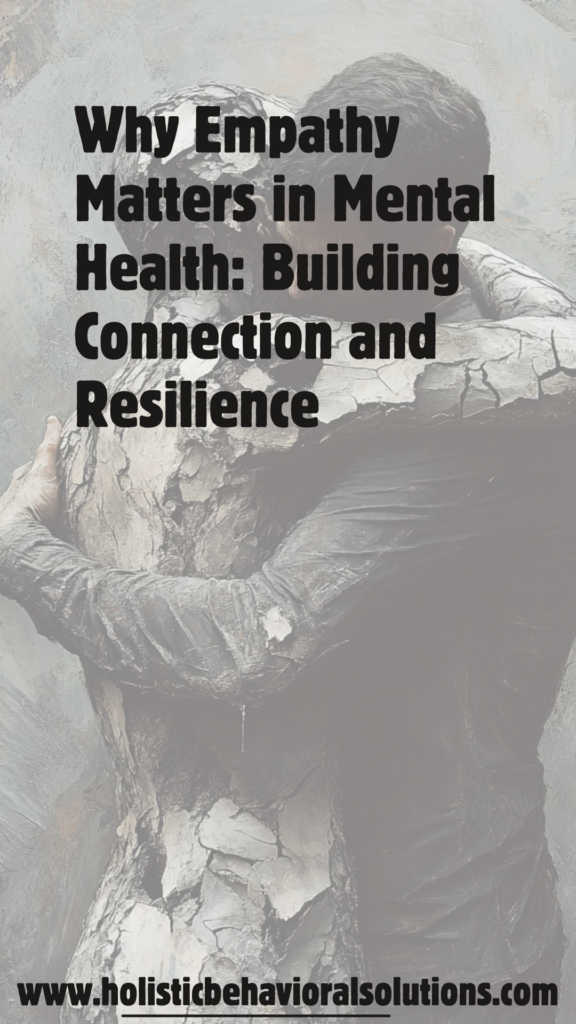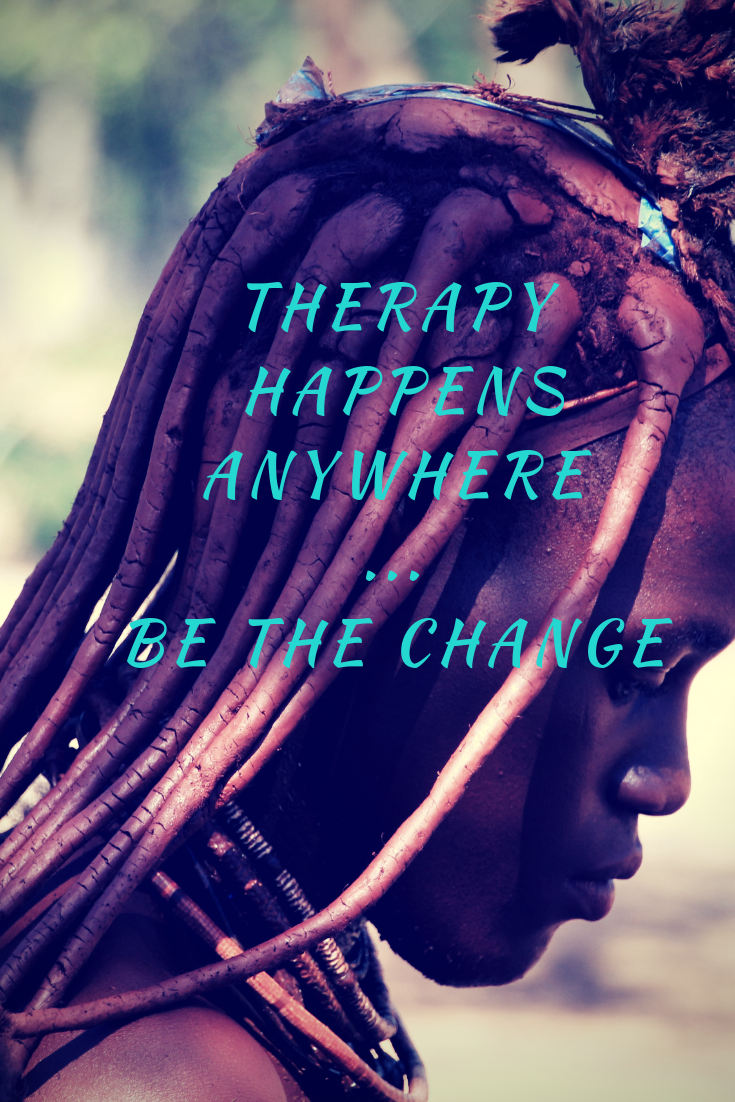
Empathy—the ability to understand and share another person’s feelings—plays a powerful role in mental health and wellness. More than just a trait, empathy is a skill that fosters connection, understanding, and healing. In both personal relationships and therapeutic settings, empathy helps us feel seen, heard, and validated, which are essential components of emotional resilience and personal growth.
As a New Jersey therapist for over twenty years, I’ve personally witnessed how empathy matters and can transform lives and support mental well-being. I like to think about why empathy matters in mental health, how it fosters resilience and practical ways to cultivate it in our daily lives.
The Role of Empathy in Mental Health
Empathy matters and is more than simply “feeling for” someone; it’s a deep understanding that validates the other person’s experience. Research shows that empathy in mental health settings helps clients feel understood, builds trust, and enhances therapeutic outcomes (Decety & Fotopoulou, 2015). When we feel that someone genuinely understands us, we’re more likely to open up, confront our vulnerabilities, and begin the healing process.
In relationships, empathy is crucial for resolving conflicts, fostering compassion, and creating a safe space where both parties feel valued. Empathy matters and allows us to approach others with curiosity rather than judgment, which creates a supportive environment for open communication. By practicing empathy, we build stronger, more resilient relationships that contribute to overall mental well-being. Discover more about Effective Communication in Relationships and see how empathy plays a role in every healthy interaction.
How Empathy Builds Emotional Resilience
Empathy is an essential component of resilience. When we practice empathy, we strengthen our ability to navigate difficult emotions and overcome adversity. Studies suggest that empathy not only improves interpersonal relationships but also helps individuals manage stress, cope with challenges, and maintain a positive outlook in life (Kleinfelder, 2021).
Practicing empathy also helps us develop greater self-compassion, as understanding the struggles of others allows us to be kinder to ourselves. In moments of self-doubt or failure, empathy provides a gentle reminder that everyone faces challenges, making it easier to accept our imperfections and continue moving forward. Explore Resilience-Building Techniques to learn more about integrating empathy into your personal growth journey.
Cultivating Empathy: Practical Steps
- Practice Active Listening
Active listening is a foundational skill in empathetic communication. By fully focusing on the speaker, reflecting back their words, and avoiding interruptions, we show that we value their experience. Active listening not only helps us understand others but also strengthens our relationships. To delve deeper into this practice, see Active Listening Tips and transform your interactions. - Ask Open-Ended Questions
Rather than jumping to conclusions or making assumptions, try asking open-ended questions. This approach encourages the other person to share their story, helping you gain a fuller understanding of their perspective. Open-ended questions foster trust and signal genuine interest, which enhances empathy. - Observe Nonverbal Cues
Empathy isn’t just about words; it also involves tuning into nonverbal signals, such as body language, tone of voice, and facial expressions. These cues offer insight into the emotions beneath the surface. By paying attention to nonverbal communication, you show sensitivity to the other person’s experience, which deepens connection and understanding. - Practice Self-Reflection
Empathy extends to understanding our own emotional landscape. Reflect on your own feelings, biases, and reactions to increase self-awareness. The more we understand ourselves, the better equipped we are to empathize with others. Practicing self-reflection strengthens our emotional intelligence, a key factor in healthy relationships and mental health. - Set Aside Judgment
Empathy requires us to approach situations with an open mind. Setting aside preconceived notions and avoiding judgment creates a space where others feel safe to share. This nonjudgmental stance is essential for building trust and rapport, both in personal relationships and therapeutic settings. For more tips on fostering empathy, explore Mindful Communication Strategies.
Empathy Matters in Therapy: A Healing Force
In therapy, empathy is a vital component of the therapeutic alliance—the collaborative bond between therapist and client. A therapist’s empathy validates the client’s emotions, making them feel valued and understood. Studies confirm that empathetic therapy not only increases client satisfaction but also improves mental health outcomes (Elliott, Bohart, Watson, & Greenberg, 2011).
The therapeutic relationship is often the first time clients experience deep, nonjudgmental empathy, which can be transformative. Empathy enables clients to explore sensitive issues, process difficult emotions, and begin a journey of self-acceptance. If you’re interested in how empathy influences therapy, consider exploring The Role of Empathy in Therapy for a closer look at its impact.
Empathy Matters and Cultural Competence: Supporting Diverse Perspectives
Cultural competence is essential to cultivating empathy in a diverse world. Understanding someone’s experiences, especially those shaped by different cultural backgrounds, requires openness and sensitivity to perspectives beyond our own. Cultural competence is about recognizing and valuing these differences, which is essential for creating inclusive, empathetic spaces.
By learning about different cultures, seeking to understand various life experiences, and avoiding assumptions, we can foster respectful and supportive empathy. This skill is crucial for professionals, especially when working with diverse populations such as the one we focus on in New Jersey. To learn more about the intersection of empathy and culture, read Fostering Cultural Competence in Mental Health.
Empathy Matters in Daily Life: Making a Difference One Interaction at a Time
Empathy doesn’t belong only in therapy; it belongs in every part of our lives. Each day offers us opportunities to practice empathy with family, friends, coworkers, and even strangers. A small act of understanding—such as giving someone space to express themselves, offering support without judgment, or simply listening—can have a powerful ripple effect.
When we prioritize empathy, we create an environment where everyone feels valued and understood. Empathy is a skill that transforms not only our relationships but also our mental health, providing resilience and fostering genuine connection.
Empathy Matters: Enhance Your Emotional Wellness with Our Holistic Store
Empathy enriches mental well-being, and prioritizing your own health empowers you to connect more deeply with others. Visit our Holistic Store to find wellness supplements designed to support emotional clarity, mental balance, and inner resilience. Investing in yourself is the first step toward building a life filled with understanding, compassion, and connection.
PS: Are you a culturally competent IIC clinician with a passion for empathetic support? Our practice is hiring in New Jersey! Check out our Careers page to join a team that values inclusivity and empathetic care.

